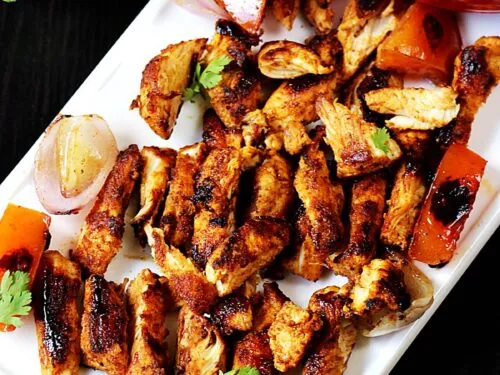How to Make Tahini (Sesame Paste)
Updated: March 1, 2024, By Swasthi
Learn how to make smooth, nutty and delicious Tahini at home with this easy recipe. This light brown paste Tahini, made from sesame seeds is a culinary ambrosia for many. It can be used in sweet or savory recipes, thinned or thickened depending on its use. Tahini also has some surprising health benefits. Whether homemade or store-bought, Tahini is an essential ingredient to many different global cuisines.
But what is tahini?
About Tahini
Tahini is a paste made from ground, hulled sesame seeds. Sometimes the seeds are roasted before being ground. A spoonful of Tahini is nutty, rich, and a little bitter with a silky mouthfeel.
Sesame seeds, the main ingredient in Tahini, have a long history with humans. While most wild sesame seed plants started in sub-Saharan Africa, domestic sesame seeds were first grown in India around 3500-3050 BCE.
Their cultivation spread and now Tahini is used in many different cuisines throughout the Middle East, North Africa, Mediterranean, and South Caucasus.
Sesame seed paste is even used in certain parts of East and South Asia, although it’s generally not called Tahini.
The best tahini comes from Ethiopian-grown Humera sesame seeds. They’re prized for their flavor, which comes from the soil and local growing conditions.

Health Benefits of Tahini
Tahini is a surprising nutritional powerhouse. It’s an excellent source of plant-based protein and fiber while being rich in vitamins and minerals – in particular copper, which helps the body absorb iron and regulates blood pressure and prevents blood clot formation.
Other important minerals in Tahini include selenium, which helps the immune system, and phosphorus, which maintains bone health.
Sesame seeds, the main ingredient in Tahini, may also help lower blood pressure and promote heart health.
Keep in mind that Tahini has lots of omega-6 fatty acids, a type of polyunsaturated fat found in vegetable oils. Your body needs omega-6 fatty acids, but if you aren’t also consuming enough omega-3 fatty acids you might develop problems with chronic inflammation.
Make sure you moderate your omega-6 intake and eat plenty of omega-3 foods to keep everything in balance!
Uses
Chefs and home cooks who love tahini have developed some creative uses for it. It is commonly used as a sauce to serve over or with other foods, either on its own or mixed with olive oil, herbs, lemon, jam, honey, or garlic.
Spread it on toast, serve as a dip with cut fresh vegetables or pita, toss with a Vegetable Salad as a dressing, or smother some Falafel or grilled Kebabs with it.
You can also drizzle a generous amount of tahini in your Shawarma rolls, Wraps and Veggie Burgers.
It’s the star of sesame halva (or halwa), a type of dessert confection popular throughout the Middle East, Mediterranean, and the Balkans. Halva is made with tahini and some kind of sweetener like sugar or honey.
Bakers can throw it into baked goods like cookies and cakes for a unique, nutty taste and moist texture.
Fans of chickpea hummus and eggplant baba ganoush recognize Tahini as an important ingredient that lends these dips a smooth texture and subtle flavor.
Top frozen yogurt with a squeeze or drizzle of tahini for a healthier alternative to Magic Shell ice cream topping.
Peanut butter and jelly fans may like the sweet and savory combination of a tahini and Date Syrup sandwich.
You can even roast your fish in a layer of tahini to keep the flesh moist and create a charred edible crust.
There are so many ways to use tahini, the only limit is your imagination!
Photo Guide
How to Make Tahini (Stepwise Photos)
1. Dry roast cleaned sesame seeds on a medium flame until they begin to pop. If you prefer raw tahini, you can skip roasting.

2. Cool completely and add them to a grinder or a food processor jar. Add a pinch of salt if you like.

3. Blend it on a medium speed until all the seeds are crushed well. You can scrape off the sides and repeat again. Make sure the jar or the seeds do not turn hot or warm while blending as this can easily make your tahini bitter.

4. Add olive oil. Make sure the seeds are well crushed before adding oil.

5. Blend well again until you get a smooth consistency. Tahini is ready.

Store it in a clean airtight glass jar. This keeps good for few months, but best thing is to make it in small quantities and use up with in a month. Singapore has a tropical climate, some foods do not keep good without refrigeration so I refrigerate it and use up within 2 weeks.

Here are more ideas to use it
- Wraps & sandwich: Spread it on a chapati/tortilla/roti / bread. Toss some steamed or fresh vegetable juliennes in little salt, black pepper, lemon juice and any spice blend like garam masala or all spice. Add these to the roti. Wrap it and serve. If using bread, just cover with another slice of toasted bread.
- Jam toast or wrap: Spread it over a butter toasted slice of bread or roti or tortilla. Spread some fruit jam. Wrap or cover with another slice of bread.
- Pasta & noodles: Add a spoonful of this to your pasta or noodles towards the end and toss.
Related Recipes
Recipe Card

How to Make Tahini (Sesame Paste)
For best results follow the step-by-step photos above the recipe card
Ingredients (US cup = 240ml )
- ¾ cup sesame seeds
- 2 to 3 tablespoons olive oil (skip if you have a high speed blender)
- 1 pinch salt (optional)
Instructions
Preparation (skip if using hulled sesame)
- If using unhulled sesame seeds, rinse them in lots of water and rub with both your palms.
- Drain them to a colander and repeat the rinse few more times. Shake off the colander to get rid of excess water.
- Pat them dry with a kitchen clothe.
How to Make Tahini
- Roast sesame seeds on a low to medium flame until crunchy and aromatic. Cool them completely.
- Add them to a processor or grinder jar along with salt if using.
- Blend until the seeds are crushed well and fine. Within a few minutes the seeds will begin to release oils.
- If you do not have a high speed blender add the oil as needed and blend until it turns to a smooth paste.
- Store tahini in a airtight glass jar.
Notes
NUTRITION INFO (estimation only)
© Swasthi’s Recipes
This Post was first published in May 2018. Updated and republished in March 2024.
About Swasthi
I’m Swasthi Shreekanth, the recipe developer, food photographer & food writer behind Swasthi’s Recipes. My aim is to help you cook great Indian food with my time-tested recipes. After 2 decades of experience in practical Indian cooking I started this blog to help people cook better & more often at home. Whether you are a novice or an experienced cook I am sure Swasthi’s Recipes will assist you to enhance your cooking skills. More about me
Follow Swasthi’s Recipes








Comments
A very informative and easy to follow recipe
Helpful and nice description
informative
Really interesting.. thankyou for sharing this good knowledge with us
Love anything homemade. Wanted to use up the sesame seeds I had so tried this. Turns out good. Will be using it to make tahini sauce
recipe k saath step by step pic show nhi kr rha he
can you check on a different browser
Can we use coconut oil instead of olive oil?
Yes you can